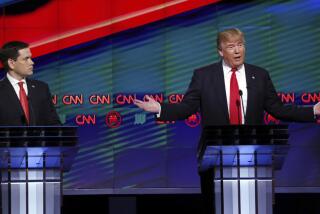Newt Gingrich launches presidential run with a newfound focus
- Share via
Reporting from Washington — Newt Gingrich is entering the 2012 presidential race as a familiar face — a 20-year veteran of Congress who served a polarizing turn as House speaker before assuming a career as a prolific political commentator and author.
But Gingrich, who officially announced his White House bid Wednesday, is bringing a decidedly different approach to this contest than he did to his previous stint in public office.
In his speeches and campaign appearances, Gingrich is expected to lay out a political vision that intertwines fiscal and social conservatism, drawing from a newfound interest in religion he has infused into his work in recent years.
It’s a message he’s expected to make Friday at the Georgia Republican Party convention in what advisors are billing as his formal announcement speech, an address that will marry the concept of American exceptionalism with an emphasis on God-endowed rights.
“I think he is going to use language that is aligned with fiscal conservatives but has a truth and appeal to people concerned with moral issues,” said spokesman Rick Tyler.
The strategy is aimed at shoring up Gingrich’s standing with the party’s social conservative wing, a constituency that regarded him with suspicion in the past, in part because of his three marriages and admission of an extramarital affair.
But in recent years, the former speaker has made gains among evangelical leaders — the result of aggressively cultivating relationships with influential national figures and local pastors in key nominating states.
Gingrich, who was raised a Lutheran and became a Southern Baptist when he entered politics, converted two years ago to the Roman Catholic faith of his third wife, Callista — an experience that he said shaped his new focus on faith. Since then, he created a nonprofit organization aimed at religious conservatives, called Renewing American Leadership, or ReAL, appointing to the board evangelical leaders such as Jim Garlow of Skyline Church in La Mesa, Calif., and David Barton of the Texas-based WallBuilders.
Last year, Gingrich helped secure seed money for a successful campaign to oust three Iowa Supreme Court justices who approved same-sex marriage in the state.
Gingrich is now hoping his network of conservative Christian leaders will help him win over evangelical voters, who play an outsize role in deciding the Republican presidential nominating contests in Iowa and South Carolina.
In 2008, evangelicals made up 60% of Republican caucus-goers in Iowa, up from 40% in recent years. The large boost was attributed to the candidacy of former Arkansas Gov. Mike Huckabee, a Southern Baptist minister who won the GOP caucus.
Whether Gingrich’s strategy succeeds depends in part on what Huckabee decides to do this year.
“Newt has a real shot at mobilizing the evangelical Christian community,” said David Lane, an influential organizer of conservative Christians, noting Gingrich’s extensive outreach to pastors.
But if Huckabee runs again, Lane added, Gingrich “might have a more difficult time.”
Gingrich is expected to spend Monday and Tuesday in Iowa, with other trips to New Hampshire and South Carolina soon to follow. To finance his activities, he will draw from funds he collected as part of a “testing the waters” campaign he launched in early March. It’s not yet clear how that fund — which will be rolled over into his presidential campaign committee — compares with those set up by other GOP presidential hopefuls, as the next reports to the Federal Election Commission will not be filed until July.
But Gingrich has a known advantage over his competitors, thanks to a network of profit and nonprofit organizations he assembled since leaving Congress. The various organizations, including American Solutions and ReAL, have together collected more than 1.7 million voter and donor contacts and raised more than $30 million in 2009 and 2010, outpacing fundraising during that period by any other potential presidential candidate.
Gingrich also has long-standing credibility within the party on fiscal matters, in part because of his work on a balanced budget as House speaker. But casting his economic message in moral terms now is crucial, said Dennis Goldford, a professor of politics at Drake University in Des Moines.
“Because the economy has become such a predominant issue, you’ve got a lot of social conservatives concerned their issues are going to be pushed into the background,” he said.
Whether the former speaker can appeal to them is an open question, Goldford said, adding that Gingrich “carries a lot of baggage.”
Gingrich has done his best to dispel those concerns in private meetings with pastors, expressing contrition for his past personal failings. Publicly, he has stressed a need for the party to emphasize morality.
“I’m here to tell you that if you don’t start with values … the rest of it doesn’t matter,” Gingrich told a conservative conference organized by Republican Rep. Steve King of Iowa in March.
Conservative Christian leaders in Iowa and elsewhere said Gingrich had made some inroads.
Still, some evangelical leaders believe he has more work to do.
“He’s got a big problem, especially with evangelical women,” said Richard Land, president of the Southern Baptist Convention’s Ethics and Religious Liberty Commission. “They don’t trust him.”
More to Read
Get the L.A. Times Politics newsletter
Deeply reported insights into legislation, politics and policy from Sacramento, Washington and beyond. In your inbox twice per week.
You may occasionally receive promotional content from the Los Angeles Times.










